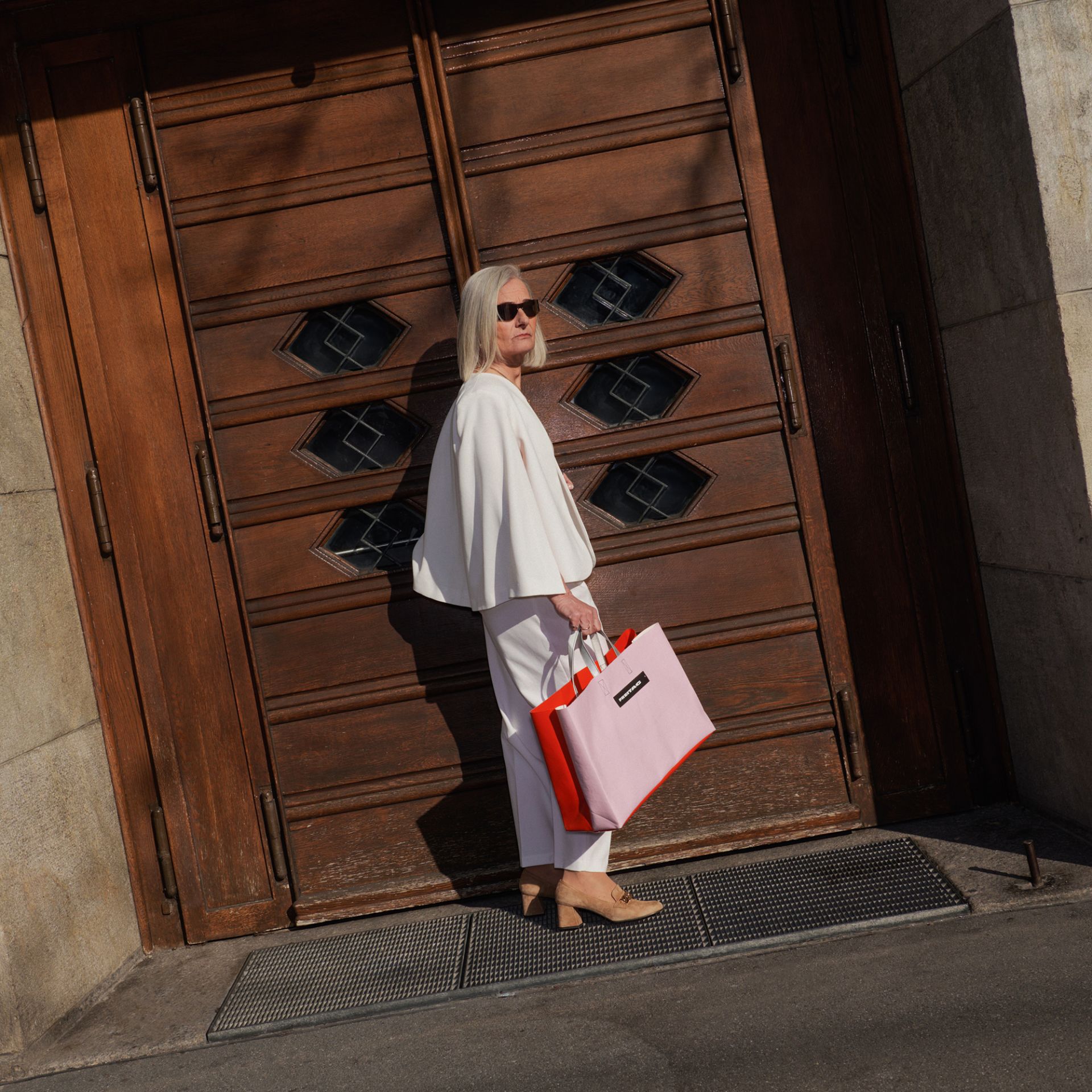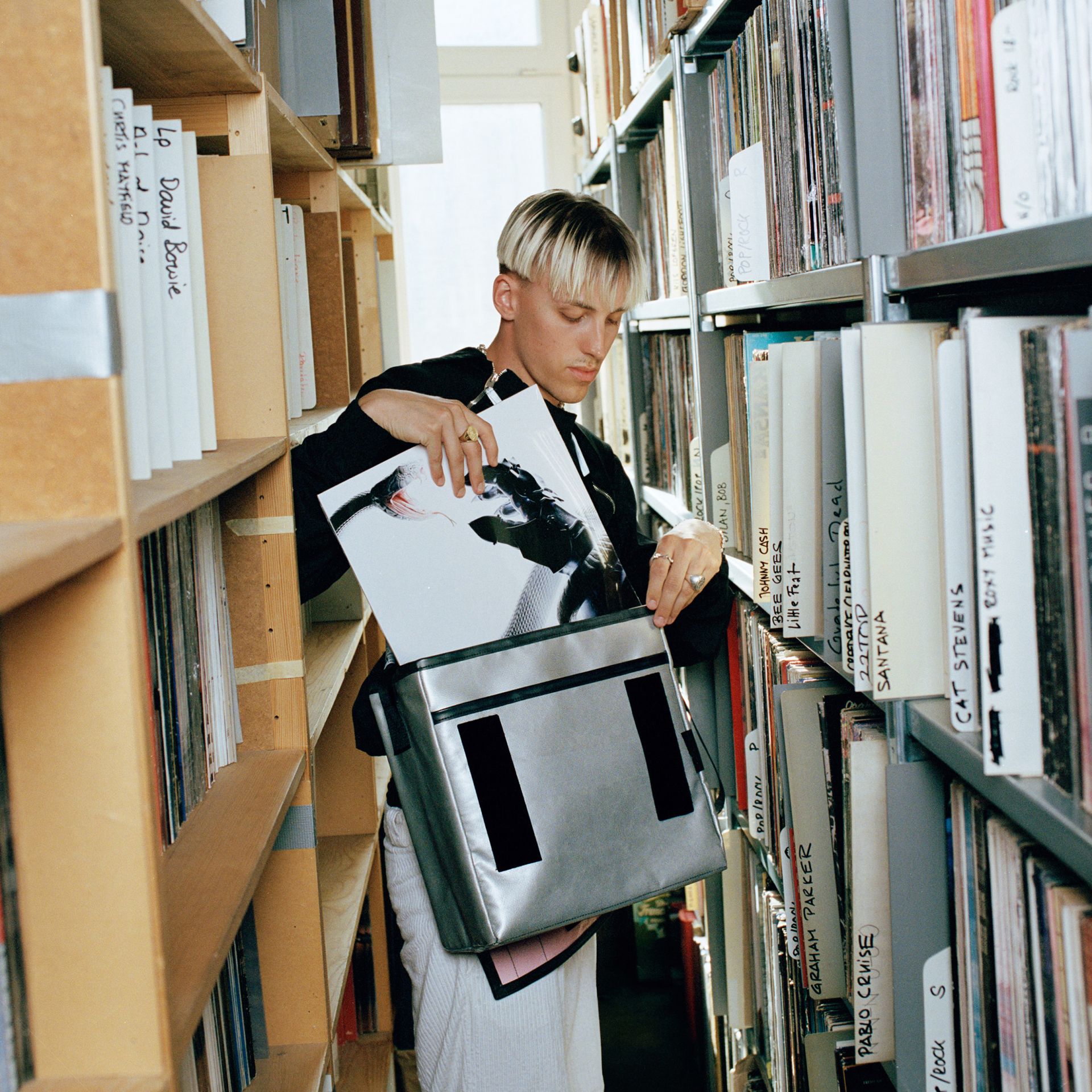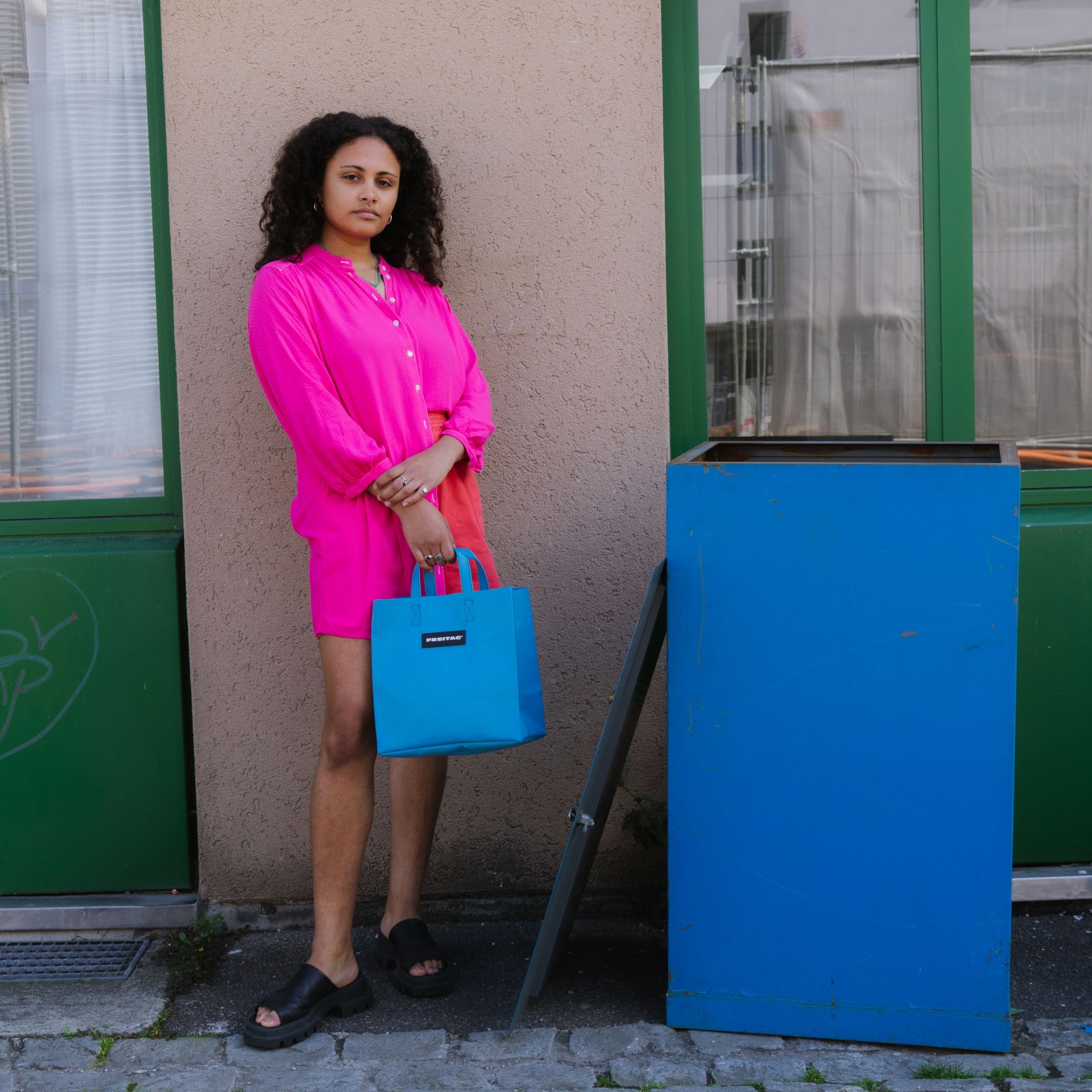Bigna: We need to see waste as a resource and make it reusable. In this way, we can bring cycles full circle. This way of thinking is integral to my professional and personal everyday life.

Circular Tarp
For more than 25 years, FREITAG has sustained a clearly defined corporate philosophy: namely, «We think and act in cycles». Today, we’re thinking mainly about how we can act even better in closed cycles. How much better it would be if our bags were not only recycled but also endlessly recyclable. In other words, if we could give discarded truck tarps not only a second life but an everlasting one. To this end, we are researching and working with various combinations of materials. And something that was only a big idea a short time ago has already been mounted on a small truck. So now, the first two prototypes of a circular tarp are out on the road doing their first test run.
THE TARP OF THE FUTURE
What will it take to ensure that the truck tarps we use to make most of our iconic bags and accessories will one day be circular and no longer end up as waste?
The answer to this question is simple but challenging: FREITAG will develop a circular truck tarp. It will do that with various industrial partners in the materials, chemicals, and composite sectors, as well as manufacturers, logistics companies, and institutions in the materials-testing and recycling industries. They all share the same vision and see the potential of the circular economy, which is why we work collectively without being financially dependent.

WHAT HAS HAPPENED SO FAR?
FREITAG began its search for the tarp of the future in fall of 2020. Instead of ending up in the garbage, the new tarp – or, more correctly, the FREITAG one-offs made from it – would one day return to the biological or technical cycle. This means that it must be biodegradable or can be broken down into its chemical constituents, which can then be recycled to make new tarps or other products. And, of course, the material must be robust, durable, water-repellent, and practical.
To implement it, we brought various players with the necessary expertise on board. The resulting heterogeneous and highly motivated community has taken flexible, parallel approaches toward achieving the clearly defined goal of a tarp revolution. In 2022, the first prototypes were mounted on a delivery van and sent out on a two-year test drive. In 2024, these pioneer tarps completed their maiden voyage, returned to FREITAG, and now provide valuable insights into the material's properties and recyclability.
FIRST TRUCK TEST FLEET ON THE ROAD
Meanwhile, the search for the perfect material continued in the background, and the work is bearing fruit: two sub-projects are now ready for the endurance test. And that’s why the circular tarps are now traveling around in convoys. In Planzer, a Swiss logistics company, we found a partner in the road freight industry that fitted out six trucks and five trailers with two different test tarps. The tarps were supplied by Bieri Tenta AG, who also printed them and spent many hours on extensive material tests to ensure that they could be processed and carry signage.
LARGE AMOUNT OF MATERIAL BRINGS FRESH INSIGHTS
The vehicles will be on the road for varying lengths of time. By staggering the test periods, we can track more precisely the material’s aging process under everyday conditions.
Thanks to the large amount of material involved, it will soon be possible to test downstream bag production steps, such as washing, cutting, and sewing at FREITAG, as well as the necessary approaches to recycling.
MATERIALS: TWO SOLUTIONS ON THE ADVANCE
Like its conventional predecessors, the new circular tarp will have a rugged base fabric and a soft, water- and dirt-repellent coating. Since the project kicked off in 2021, several possible material combinations have emerged that have been the focus of research by the various partners. Two highly advanced approaches are currently being put through their paces on the test fleet: PES/TPU and PP/PP.

THE PES/TPU APPROACH: ADVANCED AND TESTED
The printed tarps attached to the sides of the test vehicles were manufactured by Heytex using a polyester (PES) fabric coated with a thermoplastic polyurethane (TPU) developed by materials specialists Covestro.
The properties of this material combination have been vastly improved. The PES/TPU tarp has not only passed the EPEA* material health test but already meets ISO side-curtain standards for 40-tonne trucks. Further development of the material has also improved its printability, handling characteristics, and suitability for additional processing, all critical issues for the road freight industry and FREITAG.
We are currently working with Covestro and Swiss recycling company DePoly SA to develop recycling processes for TPU/PES tarps.
*EPEA - Part of Drees & Sommer evaluates materials using the Cradle to Cradle® approach and focuses on all-around material health for humans and the environment, technical recyclability, and the implementation of a take-back system.
THE PP/PP APPROACH: A LOW-PRICE MONO-MATERIAL
The base fabric and outer coating of the tarps used for the roofs of the trucks and trailers is made of polypropylene (PP). This approach is convincing at several levels. The PP/PP tarp is called Rivercyclon. It is a mono-material that is recyclable without the need for complex material separation and is cost-effective.
Initially, the material’s printability posed a challenge, but in the meantime, the first successful digital prints have been completed together with tests for silkscreen and stencil prints. Dutch tarp manufacturer Rivertex is in charge of this approach, which holds an EPEA Circularity Passport® testifying to its high material health and recyclability.
FURTHER MATERIAL APPROACHES
Our main focus is currently on the two approaches out on multiple convoy-based test drives. However, we are also working on other solutions and closely following developments in the market.
For instance, some players focus on mono-material tarps made of PET/PET or TPU/TPU. We’re also keeping a close eye on a promising research project involving several participants working on developing a bio-based tarp. However, none of these approaches is yet mature enough for testing.
CIRCULARITY AND BUSINESS MODELS
It is not yet clear which of the various material combinations will result in commercially viable circular truck tarps in the future. Apart from the enormous demands placed on the tarp regarding quality and circularity, marketability will play a decisive role in the project’s success.
At a large round table meeting, we drafted various possible business models together with all the partners involved, but a precisely defined business case is still a long way off. The aim is to build a coherent and dynamic network that enables us to keep products and materials of the highest possible quality in circulation. Demonstrating the tarps’ circularity will be a crucial factor in making them successful, as will the information flow. To expedite this, we have the EPEA Circularity Passport® Product (see below); together, FREITAG and Bieri have jointly developed the Digital Product Passport for truck tarps, an innovation in terms of transparency and traceability.
CIRCULARITY PASSPORT
To prove that products fulfill circularity criteria, EPEA is developing the so-called Circularity Passport® Product (CPP). Taking this as its guideline, the organization checks and evaluates the entire system behind a circular product, all the materials used, and their recyclability, and provides an overall assessment of the degree of circularity.
But to guarantee a product’s circularity, we must prove it and provide as much relevant information as possible. Only this way can we create a network of reverse logistics geared towards regenerating value from tarps at the end of their lives—in this case, in the form of highly desirable one-of-a-kind bags.

INTERVIEW INTERVIEW INTERVIEW INTERVIEW INTERVIEW INTERVIEW INTERVIEW INTERVIEW INTERVIEW INTERVIEW INTERVIEW INTERVIEW INTERVIEW INTERVIEW INTERVIEW INTERVIEW INTERVIEW INTERVIEW INTERVIEW INTERVIEW INTERVIEW INTERVIEW INTERVIEW INTERVIEW

OUR CIRCULAR TECHNOLOGISTS TELL ALL
Anna and Bigna inject the role of Circular Technologist at FREITAG with a lot of energy.
They constitute something like our own internal center of excellence for the circular economy and environmental technology. And, as part of their involvement in various projects, help to ensure FREITAG is even better at meeting circularity criteria.
At the moment, however, their main task is still quite far removed from our core business: the development of a truck tarpaulin that meets circularity criteria 100%.
Bigna: We need to see waste as a resource and make it reusable. In this way, we can bring cycles full circle. This way of thinking is integral to my professional and personal everyday life.
To be more precise, we’re assessing the ruggedness and resilience of these materials and compounds. And to ensure that each manufacturing step and chemical component genuinely meets circularity criteria, the EPEA research institute subsequently evaluates them in a series of complex tests using the Cradle to Cradle® method.
To put it in a nutshell: We try to ensure that all our materials and products meet circularity criteria and in that way avoid waste.
However, new forms of cooperation are also emerging because a wide variety of companies and specialists along the entire value chain are needed to ensure that the tarp ultimately returns to the cycle.
But it’s clear that rugged, coated textiles like these, which also have the advantage of being circular, will likewise be an exciting alternative for tent manufacturers, architects and the events sector, for example.
What we do know, however, is that it will take about five years for the used circular tarps to come back from the streets and for us to cut them up to make the first FREITAG bags from them.
Bigna: I’m particularly pleased to say that, in some tests, the biologically based coating material has outperformed even conventional synthetics. We want to stick to this path, even if it involves considerably more development work.







